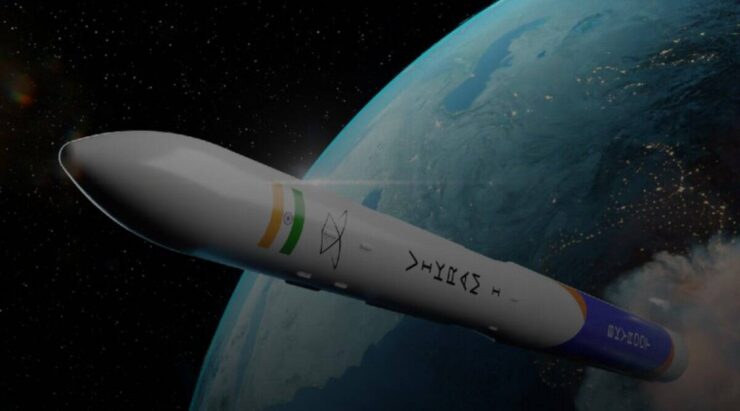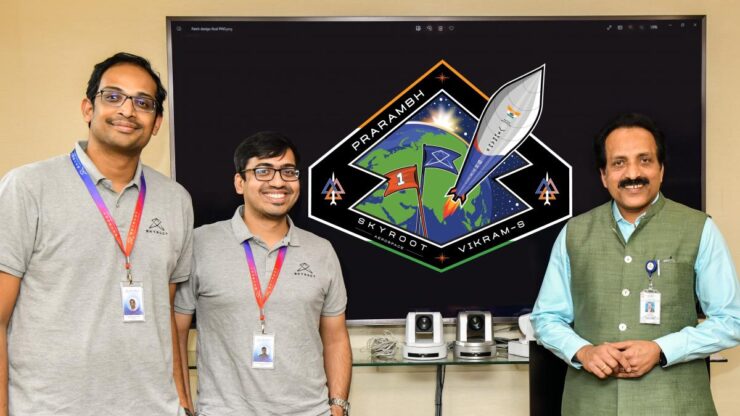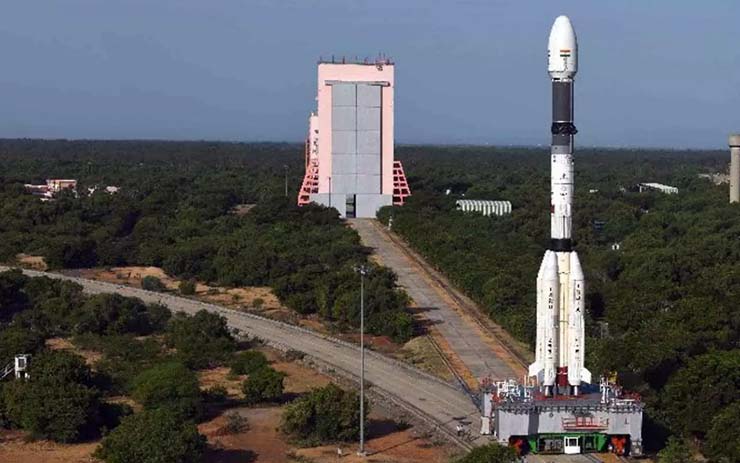
‘Prarambh’ a major milestone: On November 18, 2022 at 1130 hrs Indian time the first privately developed rocket named Vikram-S was launched from the Indian Space Research Organisation (ISRO) spaceport in Sriharikota. The rocket was designed and manufactured by Skyroot Aerospace Pvt. Ltd. The launch vehicle was named after Dr. Vikram Sarabhai, as a tribute to the renowned physicist and astronomer, often called the Father of India’s space programme. The mission was named ‘Prarambh’ meaning ‘beginning’ in Hindi. Successful launch of the rocket indeed signifies beginning of a new era and is a major milestone. With this the Indian private space sector has made its first foray into the blue yonder of space.
Vikram-S: The rocket
Vikram-S is an 8 m tall and a 38 cm diameter sub-orbital rocket, powered by solid fuelled, single stage rocket, weighing 545 kg with a payload capacity of 80 kgs with 100 km altitude. It took off with three dummy payloads from customers- Space Kidz India, N-Space Tech India and Bazoomq Armenia. These payloads carried sensors and instruments to validate the flight-worthiness and payload integration process.
The rocket flew for 5 minutes, achieved an altitude of 89.5 kms and a range of 141.2 kms (against the planned 81.5 kms and 110.8 kms respectively), before splashing into the Bay of Bengal, thereby exceeding the planned objectives. All three payloads seem to have functioned satisfactorily.
Nationwide Adulation
Success of Vikram-S launch received appreciation from all quarters. After the launch, PM Narendra Modi tweeted: “A historic moment for India as the rocket Vikram-S, developed by Skyroot Aerospace, took off from Sriharikota today! It is an important milestone in the journey of India’s private space industry. Congrats to @isro & @INSPACeIND for enabling this feat”.
Union Minister of State (Science & Technology and Space), Dr Jitendra Singh witnessed the launch from Indian spaceport, Satish Dhawan Space Centre SHAR (SDSC SHAR), Sriharikota. He complimented thus, “Today is a historic day, which marks the beginning of a new dawn – a new ‘Prarambh’ in the journey of India’s Space sector. This success bears testimony to the vision of Hon’ble PM Shri Narendra Modi, for opening up the space sector for private stakeholders in June 2020 that has enabled unlocking of the immense potential of the Indian Space Sector. It is a major step forward by India to develop its Space ecosystem and to emerge as the leader in new space frontiers. This is indeed a turning point in India’s startup moment. My heartiest congratulations to Team Skyroot, ISRO and IN-SPACe for accomplishing this commendable feat in a reasonably short period of time”.
Dr. Pawan K Goenka, Chairman of IN-SPACe too congratulated the team and said, “This maiden rocket launch for Skyroot Aerospace is perhaps the most important milestone for the Indian private space sector since the space reforms announced by Government of India, and hints at the rapid transformative journey we’re witnessing in India’s space sector. Though one small step, it is a giant leap to demonstrate the capabilities of the Indian Space sector”.
Director General of Indian Space Association (ISpA), Lt. Gen. AK Bhatt, tweeted: HISTORIC day for India!! #VikramS is a true manifestation of Hon’ble PM @narendramodi’s vision laid out in June 2020. It was made possible bcoz of PM’s guidance & motivation & intimate monitoring from @PMOIndia at each step. It is the #Prarambh of #AtmanirbharIntoSpace @SkyrootA.
Skyroot Aerospace

Skyroot Aerospace Pvt. Ltd is a Hyderabad based Spacetech startup. It was raised in June 2018, co-founded by two former ISRO engineers, Pawan Kumar Chandana and Naga Bharath Daka. It was the first among the four companies to have signed an MoU with ISRO for a satellite launch. Credit for its recent success rests with its 200 strong employees. It is one of the largest funded companies, having received close to $68 million funding, including the $51 million Series-B funding in 2022, to build infrastructure for its present launch.
Opening of Indian Space Sector
Successful launch of sub-orbital Vikram-S rocket by a private Indian Space-tech startup announces to the world that Indian private space sector is indeed opening up and our industry is prepared for a healthy competition.
As part of space sector reforms, a few new agencies have been established and assigned new roles in consonance with PM’s directions, firstly to help Indian private agencies grow and secondly for Indian economy to benefit from growing space sector.
Indian private space sector is indeed showing signs of growing. All this could happen due to a markedly bold step taken by the PM Narendra Modi in June 2020, to unlock the space sector to private players. The biggest benefit accruing from this policy change is that ISRO can now focus solely on making available the high end complex technologies, scientific missions, technical improvements in launch vehicles and satellites and thereafter pass these niche capabilities to private sector for commercialising and scaling up.
The other agency created is the New Space India Limited (NSIL), a wholly owned Government body. It was established on 6 March, 2019 for commercial use of research and development activities carried out by ISRO in the field of space.
The Indian Government has also established the Indian Space Association (ISpA) in October 2021 for collaboration between private and public players in the space-tech sector.
Stellar Role Played by IN-SPACe
The Indian National Space Promotion and Authorisation Center (IN-SPACe) has been operating as a single-window, independent, autonomous nodal agency of Department of Space (DoS) to boost private space sector economy. It operates on four pedestals of Promoting and developing Indian space ecosystem accelerating space economy; Enabling and nurturing Non Government Entities (NGEs) to accomplish their ventures in space sector; Authorise space operations and services in the country through well-defined framework; and Supervising the space activities of NGEs in the country.

So far IN-SPACe has been pretty active. It has signed 16 MoUs and five Authorisations. Besides the recently concluded launch of Vikram-S sub-orbital vehicle (‘Prarambh’ mission) by Skyroot, IN-SPACe has authorised launch of Thybolt 1 & 2 by Dhruva Space on 26 November, 2022.
It is worth acknowledging that all three Directorates of IN-SPACe, viz. Technical (TD), Project Management & Authorisation (PMAD) and Promotion (PD) are working in absolute unison, as was shown commendably during mission ‘Prarambh’ wherein the PD Directorate covered the complete progress of the mission from inception, design to authorisation, launch and post-launch achievements and appreciation received from various quarters.
IN-SPACe has a mammoth task. Skyroot is one of the India’s many Space-tech startups. Presently, there are 306 NGEs registered with IN-SPACe, of which 94 are startups. IN-SPACe is working on 155 proposals, including 17 promotions and 138 proposals seeking facilitation and authorisation.
Future of Vikram Series Rocket
Skyroot Aerospace is developing three categories of launch vehicles, these are going to be multi-stage rockets, viz Vikram-I is planned to have a payload carrying capacity of 480 kg to 500 km low inclination orbit (LIO) or 290 kg to 500 km sun-synchronous polar orbit (SSPO); Vikram-II is planned to carry a 595 kg payload to 500 km LIO or 400 kg to 500 km SSPO; and Vikram-III envisages to carry a 815 kg payload to 500 km LIO or 560 kg to 500 km SSPO.
Vikram-1 is expected to be launched during the third quarter of 2023.
Mission ‘Prarambh’ involved launching of a single stage rocket Vikram-S as a technology demonstrator, in a sub-orbital flight. Almost all systems flying on Vikram-S were designed in-house, except for a few imported sensors. The Vikram-S rocket is part of Skyroot’s Vikram series launch vehicles, powered by the Kalam 80 propulsion system. It was meant for checking avionics systems, telemetry, tracking, inertial measurements, GPS, on-board camera, data acquisition and power systems.
Implications for India
Post the success of mission ‘Prarambh’ the expectations now are that this will open doors to many other fledgling Indian Space-tech startups in various fields. There are a few other space-tech startups in the field of launch vehicles that are progressing at a rapid pace.
Indian space-tech startups have been pushing the envelope in the field of satellite manufacturing, ground segment, satellite applications and launch services.
Srinath Ravichandra, co-founder of Chennai based Agnikul Cosmos, says, “We plan to have the first launch of Agnibaan before the end of this year”. This will be a test of its Agnibaan-1 rocket in a sub-orbital flight. The required preparatory tests have been progressing satisfactorily. ISRO is confident of the result and for the first time, it has handed over one of the crucial component, ‘flight termination system’ to Agnikul, a first for a Space-tech startup.
Digantara is a Bangalore based startup that deals in space situational awareness (SSA) and space weather. It had signed a MoU with ISRO in the beginning of the year and launched a technical demonstration payload, onboard PSLV-C53, with an aim to monitor the space radiation. It is progressing confidently towards launching 40 satellites for SSA.
The successful test and space qualification of Dhruva’s satellite orbital deployer (DSOD-1U) on June 30, 2022 paved the way for the Thybolt-1 and Thybolt-2 satellites flying on PSLV-C54 on 26 November, 2022.

Pixxel, on the other hand, had its first space launch with SpaceX, where its first hyper spectral imaging satellite called ‘Shakuntala’ was put in orbit in April 2022. Pixxel too has signed an MoU for providing satellite testing support, Registration of Firefly satellites as Indian Space Object and Exploring the possibility of joint usage of EO data with ISRO. Pixxel has launched its Earth Imaging satellite, named Anand, onboard PSLV-C54 on 26 November, 2022.
With demand for satellite launches growing on the back of increasing satellite-based internet and surveillance use, private space businesses are set to grow exponentially. In fact, the Satellite Industry Association of India (SIA) expects at least 60,000 satellite launches globally by the end of 2025.
Vikram series is designed to enable this through unprecedented mass production and affordability. The leading technology architecture of Vikram vehicles offers unique capabilities like multi-orbit insertion, interplanetary missions; while providing customised, dedicated and ride share options covering a wide spectrum of small satellite customer needs.
Chandana, co-founder of Skyroot says, “The unit cost for the launch is estimated to be approximately 50 percent less than that of US and European companies. Two big salients for Vikram series are innovation and low cost”.
Also, in September 2022, HAL and L&T consortium has been awarded a contract for manufacturing five PSLV rockets at a cost of Rs. 860 Crores.
Besides this, Skyroot itself is preparing to launch at least two rockets per month by end of 2025 and is also working on reusable rocket engines. This has tremendous commercial revenue potential, exact rates though are not available. ISRO is known to be charging $10,000 to $15,000 per kg for launch services using its PSLV rocket. Size of the market can be gauged by the fact that SpaceX, since it’s raising in 2008, has undertaken 56 successful launches, averaging more than five launches per month.
Space sector demands high initial capital investment till the product or services mature into a revenue generating venture. Space Capital, Statista has brought out that since 2014, total investment globally in space sector has been $265 billion. As expected, major chunk has been by U.S. ($46.3 b) and China ($29.8 b), China opened its space sector from the state clutches from 2014 onwards and U.S. has produced a few major companies like SpaceX, Blue Origin, Capella, Digital Globe etc., which have now become household names. India has a miserly $2.3 b investment so far. However, of late, private investors have started showing interest and faith in Indian private Space-tech startups and they have started attracting some investment. Now with the success of ‘Prarambh’, more capital investment is expected to flow. Indian Space-tech startups are getting more revenue focused and are ready to address the global markets, right from their raising, this is a welcome change from Indian defence industry, which has only recently started manufacturing for the world.
All the new entrants in the space sector are looking to address both local and global opportunities and have successfully raised initial rounds of investments for product development.
The modern day warfare is evolving, in the future digitised battlefield, space capabilities would act as a major force multiplier across all domains of warfare. Indian armed forces have been aspiring to acquire an indigenous capability to place satellites into orbit at a short notice during periods of heightened tension and during hostilities. Having an indigenously designed and developed rocket ‘launch on demand’ capability offers a major strategic advantage to the Indian armed forces. It will help boost its surveillance, communication and intelligence gathering capability.
Both Skyroot and Agnikul Cosmos claim that their latest rocket engines are fully 3D printed, which gives them flexibility to manufacture engines based on demand.
In view of the space sector reforms, the armed forces through Defence Space Agency (DSA) are required to coordinate with (NSIL) to meet its requirements. An emerging private space sector capability should be leveraged to meet the armed forces requirements.
Besides these, certain Indian private Space-tech companies are exploring the option of setting up space tourism hubs within the country for enhancing the commercial aspects of space launch capability.
An EY study in collaboration with ISpA, titled, ‘Developing the space ecosystem in India: focusing on inclusive growth’, has brought out that India accounted for approximately 2.6 percent of the global space economy in 2020, amounting to $9.6 billion, which was 0.5 percent of the country’s GDP. While estimating the growth by 2025, the report brings out that the satellite services and application segment would form the largest share of the space economy accounting for 36 percent by 2025, while the space launch segment would grow the fastest by 2025 at a CAGR of 13 percent.
The Indian space industry hitherto steered by ISRO, is currently undergoing radical changes that have the potential to substantially boost Indian space economy. A large number of Space-tech startups in India are currently engaged in developing cutting edge technologies to address the challenges of today and the future. Many of them are expected to become global leaders of tomorrow in space domain and become influential building blocks for realising Indian’s $5 trillion economy dream. At this stage, it is important to have faith in them, continue to mentor and support them and create opportunities wherein their technology and products can be gainfully utilised by the government, industry and common citizens. There is an urgent requirement to create market opportunities and mobilise resources to support them.
-The writer is an IAF veteran and has been involved in air operations, intelligence and strategic matters. He has served as Assistant Chief of Air Staff (Off Ops) at Air HQ and Assistant Chief of Integrated Defence Staff (Tech Int) at HQ – IDS, appointments related to offensive operations, UAV, space and ISR matters. The views expressed are of the writer and do not necessarily reflect the views of Raksha Anirveda








